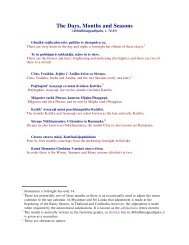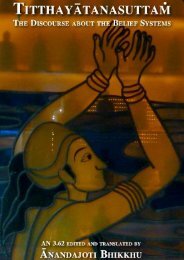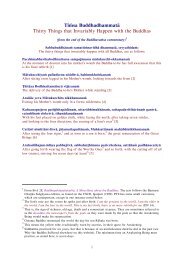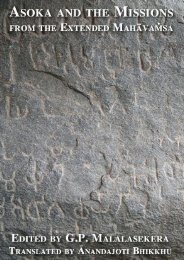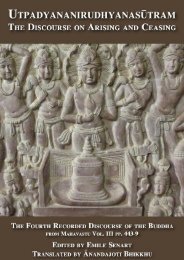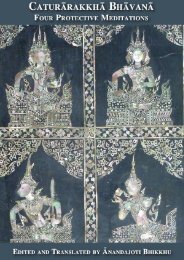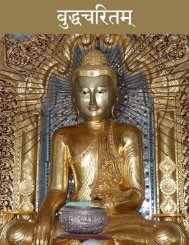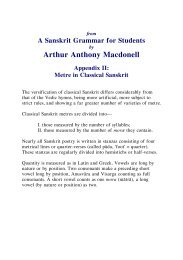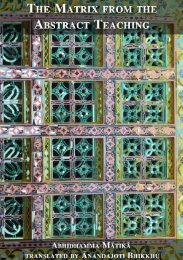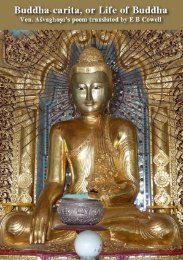MahÄkhandhako The Great Chapter - Ancient Buddhist Texts
MahÄkhandhako The Great Chapter - Ancient Buddhist Texts
MahÄkhandhako The Great Chapter - Ancient Buddhist Texts
Create successful ePaper yourself
Turn your PDF publications into a flip-book with our unique Google optimized e-Paper software.
II. Progress of the Sāsana - 97<br />
Mārakathā<br />
17: <strong>The</strong> Story about Māra 150<br />
Atha kho Bhagavā bhikkhū āmantesi:<br />
<strong>The</strong>n the Gracious One addressed the monks, (saying):<br />
“Muttohaṁ bhikkhave sabbapāsehi ye dibbā ye ca mānusā,<br />
“I am liberated from all snares, monks, both divine and human,<br />
tumhe pi bhikkhave muttā sabbapāsehi ye dibbā ye ca mānusā.<br />
you are also liberated from all snares, monks, both divine and human.<br />
Caratha bhikkhave cārikaṁ bahujanahitāya bahujanasukhāya<br />
Go on a walk, 151 monks, for the benefit of many people, for the happiness of many<br />
people,<br />
lokānukampāya atthāya hitāya sukhāya devamanussānaṁ.<br />
out of compassion for the world, for the welfare, benefit, and happiness of gods and<br />
men.<br />
Mā ekena dve agamittha, desetha bhikkhave Dhammaṁ,<br />
Do not let two go by one (way), 152 teach the Dhamma, monks,<br />
ādikalyāṇaṁ majjhekalyāṇaṁ pariyosānakalyāṇaṁ, sātthaṁ sabyañjanaṁ;<br />
(which is) good in the beginning, good in the middle, good in the end, with its<br />
meaning, with its (proper) phrasing;<br />
kevalaparipuṇṇaṁ parisuddhaṁ brahmacariyaṁ pakāsetha,<br />
explain the spiritual life which is complete, full and pure,<br />
santi sattā apparajakkhajātikā assavanatā Dhammassa parihāyanti,<br />
there are beings with little dust on the eyes who are perishing through not hearing<br />
the Dhamma,<br />
bhavissanti Dhammassa aññātāro.<br />
there will be those who will understand the Dhamma.<br />
Aham-pi bhikkhave yena Uruvelā Senānigamo<br />
I will go, monks, to Uruvelā and Senāni Village<br />
tenupasaṅkamissāmi Dhammadesanāyā.” ti<br />
in order to teach the Dhamma.”<br />
150 Cf. Dutiyamārapāsasuttaṁ in Mārasaṁyuttaṁ, SN1.4.5.<br />
151 Lit: walk a walk, which is a common sort of construction in Pāḷi, but unidiomatic in<br />
English. We can infer from the injunction that the Rainy Season is now over and the monks<br />
are free to wander around the countryside.<br />
152 Following the commentarial paraphrase: ekena maggena dve mā agamittha.




